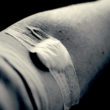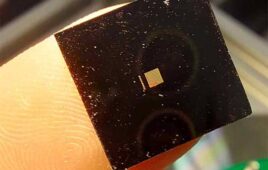
[Image from Peter Handke on Flickr]
NAFLD occurs when there is a build up extra fat in liver cells that isn’t caused by alcohol, according to the American Liver Foundation. The liver has some natural fats on it, but if more than 5–10% of the liver’s weight is fat, then it is considered a fatty liver. NAFLD usually affects people who are overweight and obese or have diabetes, high cholesterol or high triglycerides. It affects up to a quarter of people in the U.S.
“We estimate that as many as 100 million adults and children in the U.S. may have NAFLD. Determining exactly who has or is at risk for the disease is a critical unmet medical need,” said Rohit Loomba, professor of medicine in the division of gastroenterology and first author on the study, in a press release. “There are about 50 new NAFLD drugs in the pipeline, including about 5 that will likely be approved for use in the next 2 years. If we are better able to diagnose this condition, we will be better at enrolling the right types of patients in these trials, and ultimately will be better equipped to prevent and treat it.”
The researchers studied 135 participants in this study and found that the gut microbiome could predict advanced NAFLD with 88–94% accuracy.
The first group of participants included 86 patients who were diagnosed with NAFLD through a biopsy. 72 of them had mild to moderate NAFLD and 14 had advanced disease. The researchers had the microbial genes that were extracted from stool samples sequenced by collaborators at Human Longevity Inc. to figure out which species were living where and how many there was. The researchers saw 37 bacterial species that could differentiate between mild/moderate NAFLD and advanced disease. They could predict the patients who had the advanced disease with 93.6% accuracy.
A second study group evaluated 16 patients with advanced NAFLD and 33 healthy people. There were 9 bacterial species that were found that allowed the researchers to distinguish between the NAFLD patients and healthy participants with 88% accuracy.
The research team also found that patients who had advanced NAFLD were more likely to have the bacteria Proteobacteria in their stool and fewer Firmicutes bacteria in their stool than people with early-stage NAFLD. They also found that the E. coli bacteria was 3 times more common in advanced NAFLD patients than patients in the early stages.
“We believe our study sets the stage for a potential stool-based test to detect advanced liver fibrosis based simply on microbial patterns or at least help us minimize the number of patients who have to undergo liver biopsies,” said senior author and president of the J. Craig Venter Institute Karen E. Nelson.
So far, the method has only been tested on a small number of patients, but the researchers are hopeful in getting to test it in a larger setting. Upon success, the researchers say the test wouldn’t even be available for patients within the next 5 years.
The study also doesn’t suggest that the presence or absence of certain microbial species causes NAFLD, according to Loomba.
“Understanding the microbiome, just as sequencing the human genome, is one part of the puzzle on human health and disease,” said the study’s co-author J. Craig Venter, who is also the co-founder and executive chairman of Human Longevity, Inc. “New technologies, such as machine learning, are allowing for tremendous advances to interpret these data.”
The research was funded by the National Institutes of Health, American Gastroenterological Association Foundation, T. Franklin Williams Scholarship Award, Atlantic Philanthropies, Inc., John A. Hartford Foundation, OM and Association of Specialty Professors. It was published online in the Cell Metabolism journal.
[Want to stay more on top of MDO content? Subscribe to our weekly e-newsletter.]







